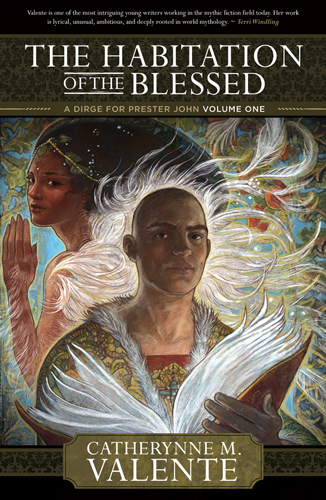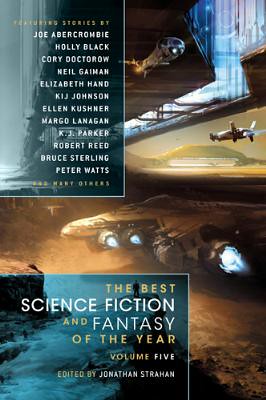
At Readercon in July, I had the pleasure of meeting -- and chatting with --
Catherynne M. Valente. You might recognize her name as the author of the novel
Palimpsest
(a city that is also a "sexually transmitted disease"), a finalist for the 2010 Hugo Award. In
Palimpsest, November, one of the four protagonists in the story, recalls briefly her favorite book as a child,
The Girl Who Circumnavigated Fairyland in a Ship of Her Own Making. After the publication of
Palimpsest, in 2009, when income became a necessity, Cat turned that children's book into an actual full-length, crowd-funded novel, which she published -- one chapter a week -- online. The novel has since been acquired by Feiwel & Friends, an imprint of Macmillan Publishers, for publication in 2011.
Meeting Cat Valente at Readercon turned out to be most propitious because shortly thereafter
Night Shade Books assigned me the project to proof, line edit, and copyedit her forthcoming novel:
The Habitation of the Blessed
-- subtitled: A Dirge for Prester John, Volume One.
In 1165, a
Letter of Prester John appeared throughout Europe. According to Wikipedia [I know... I know....] the letter was supposedly written to Emperor Immanuel Comnenus of Constantinople by Prester John, "descendant of one of the Three Magi and King of India. The many marvels of richness and magic it contained captured the imagination of Europeans, and it was translated into numerous languages....It circulated in ever more embellished form for centuries in manuscripts, a hundred examples of which still exist. The invention of printing perpetuated the letter's popularity in printed form; it was still current in popular culture during the period of European exploration. Part of the letter's essence was that a lost kingdom of Nestorian Christians still existed in the vastnesses of Central Asia." Cat Valente's novel opens with this letter, and then the author expands upon, remakes, and remixes the essence of this letter into one of the more unique stories -- and uniquely written stories -- that I have had the pleasure to read in a very long time. The fact that I also had the opportunity to work with the author on this book made it doubly rewarding.
The kingdom of Prester John is inhabited by strange beings such as the amyctryae ("whose mouths jut from their skulls and provide a deep bowl in which they brew all manner of things"), the astomii (who "have no mouths, but eat scent from the air itself"), the blemmyae (who "carry their faces in their chests and have no heads as men do"), the cametenna (who "have hands like boulders, but their fingers are deft"), and the panotii ("their great and silken ears drawn over their bodies like mourning veils"). And a great tree that bears books as its fruit, and from the fragments and remains of this fruit, we learn the story of Prester John, as told by Brother Hiob von Luzern, who happened upon this land during his missionary work in the Himalayas in 1699.
In a recent guest blog post on John Scalzi's "The Big Idea," Cat Valente states emphatically that
The Habitation of the Blessed "is a science fiction novel." Included among the many points she makes is this one, on science: "It is a story rooted in science -- just not 21st century science. The series takes as a given that every legend and folktale concerning Prester John was true, including the Fountain of Youth, which came into Western myth with this very letter, and the various grotesque monsters which may or may not have been allegories for human failings, but here are given serious considerations as races and cultures with their own deep histories. So too Ptolemaic cosmology is taken wholly seriously, with the Crystalline Spheres a hard fact of the world. How this world changes into and acquired the physics of our own is part of the long game of the series." You can read more on
Cat's Big Idea, which also includes a video entitled "Prester John: International Man of Mystery" -- the legend of Prester John as told by action figures. The vid, and more, can also be found on
Prester John Online.
I was going to provide a snippet from the Publishers Weekly review of The Habitation, and then point you to the review itself, but it appears that the review tends to shift pages, because the link I have no longer points to the correct page. So, I'll just quote the brief review in its entirety here:
The Habitation of the Blessed:
A Dirge for Prester John, Vol. 1
Catherynne M. Valente, Night Shade, $14.99 trade paper (272p) ISBN 978-1-59780-199-7
In 1165, a letter ostensibly written by the distant Christian king Prester John describing a kingdom of wonders rocked medieval Europe. In this enchanting retelling of the legend, the first volume in a projected trilogy, Hugo nominee Valente (Palimpsest) imagines what might have been discovered by Rome's ambassadors if the letter had not been a hoax. Nothing is quite as fabulous as the pious priests had hoped. Prester John and St. Thomas the Twin married nonhuman women; the Fountain of Youth does not sparkle, but instead "oozes thick and oily, globbed with algae and the eggs of improbable mayflies." Three very different personalities narrate: the brooding Prester John himself; his carefree and openhearted wife, the blemmye Hagia; and maternal Imtithal of the elephant-eared panotii. Filled with lyrical prose and fabled creatures, this languorous fairy tale is as captivating as Prester John's original letter.(Dec.)
As the
PW review states,
The Habitation of the Blessed is the first volume of a trilogy, and I'm hopeful I'll have the good fortune to be able to work with the author on volumes two and three as well.
The Habitation will undoubtedly be one of the most talked about novels in the months ahead, and will assuredly appear on multiple award lists next year.
 Tweet This
Tweet This
 I am pleased to announce that Pat Cadigan's short story, "The Taste of Night," originally published in my co-edited anthology Is Anybody Out There?
I am pleased to announce that Pat Cadigan's short story, "The Taste of Night," originally published in my co-edited anthology Is Anybody Out There? Tweet This
Tweet This



